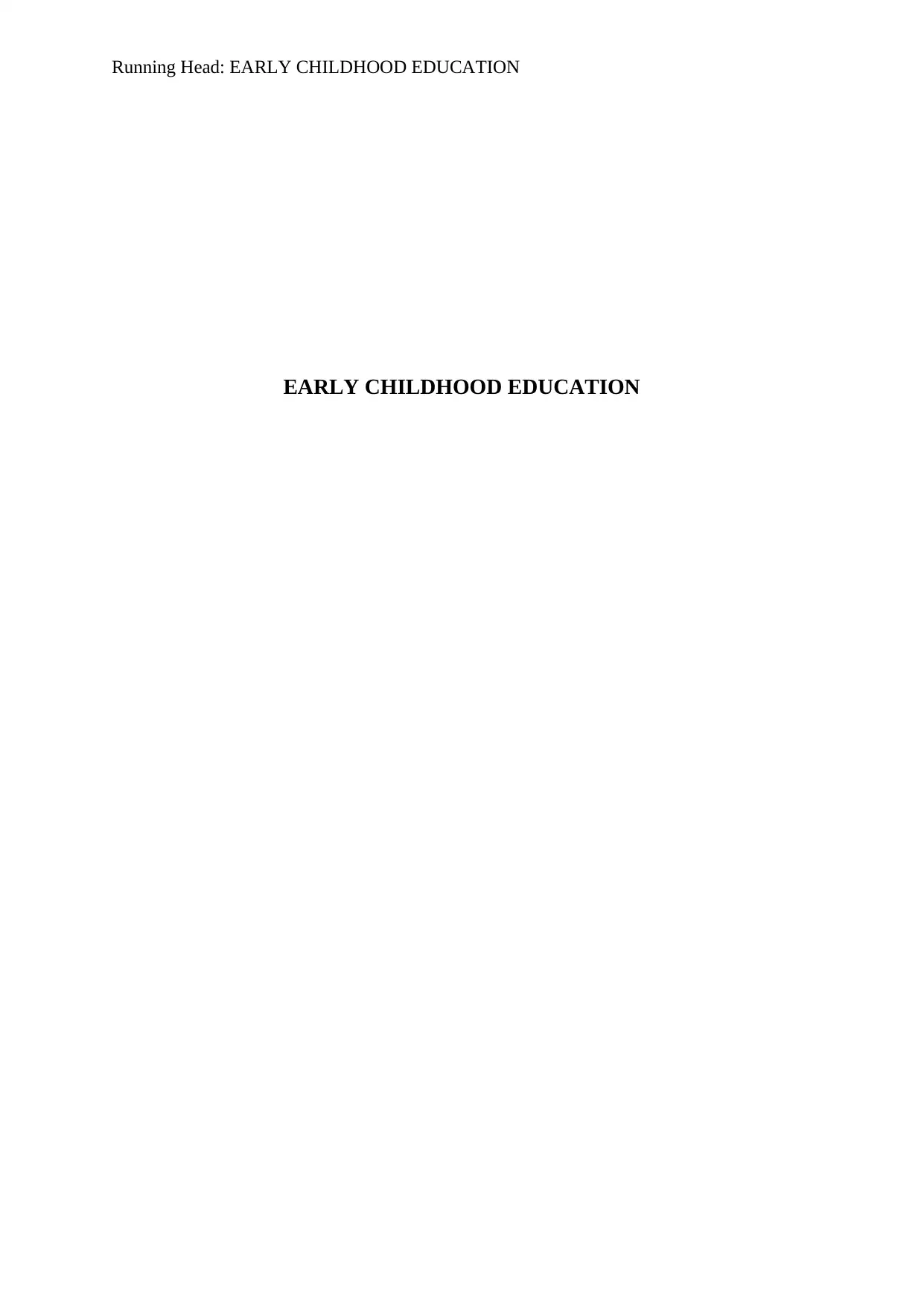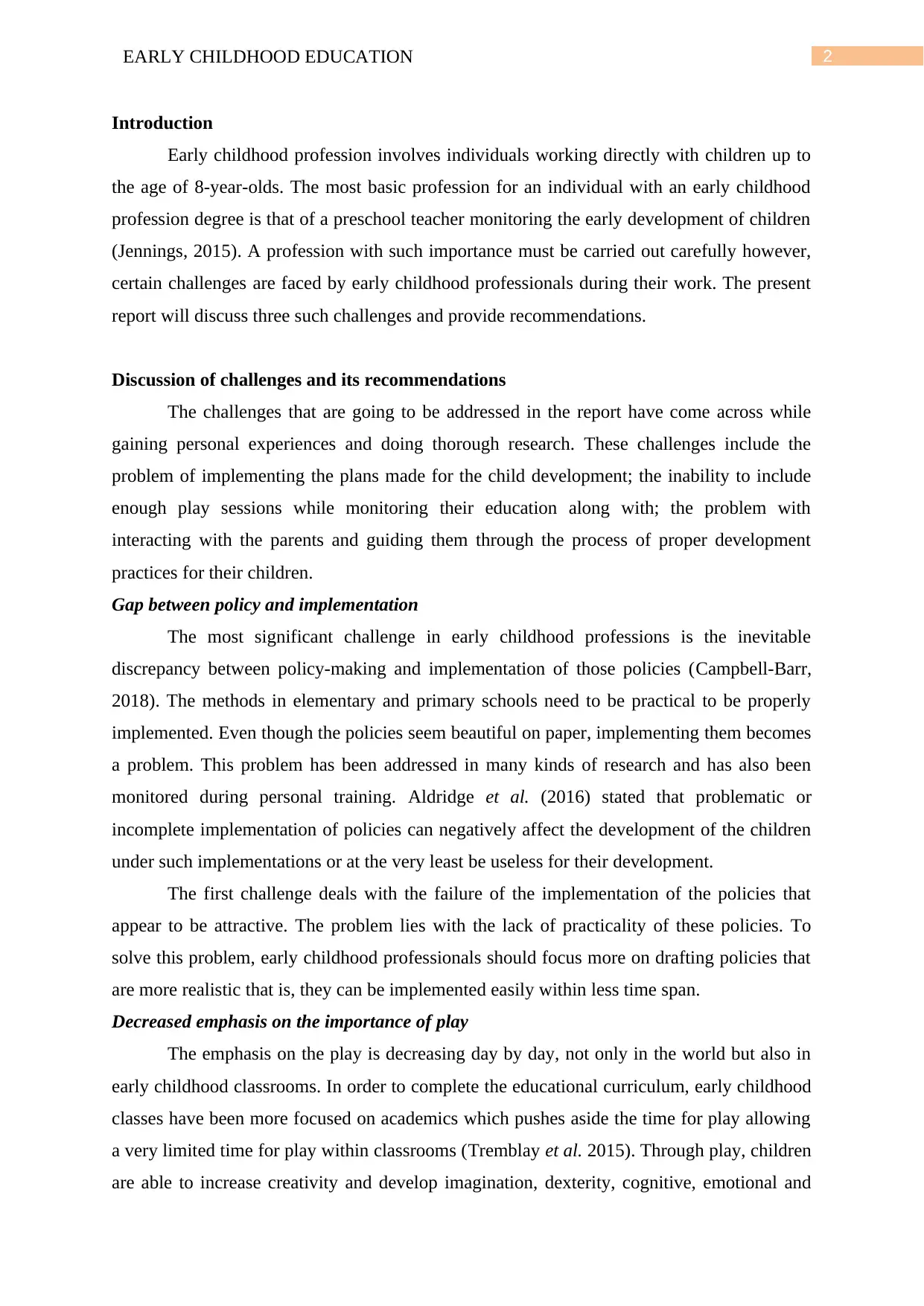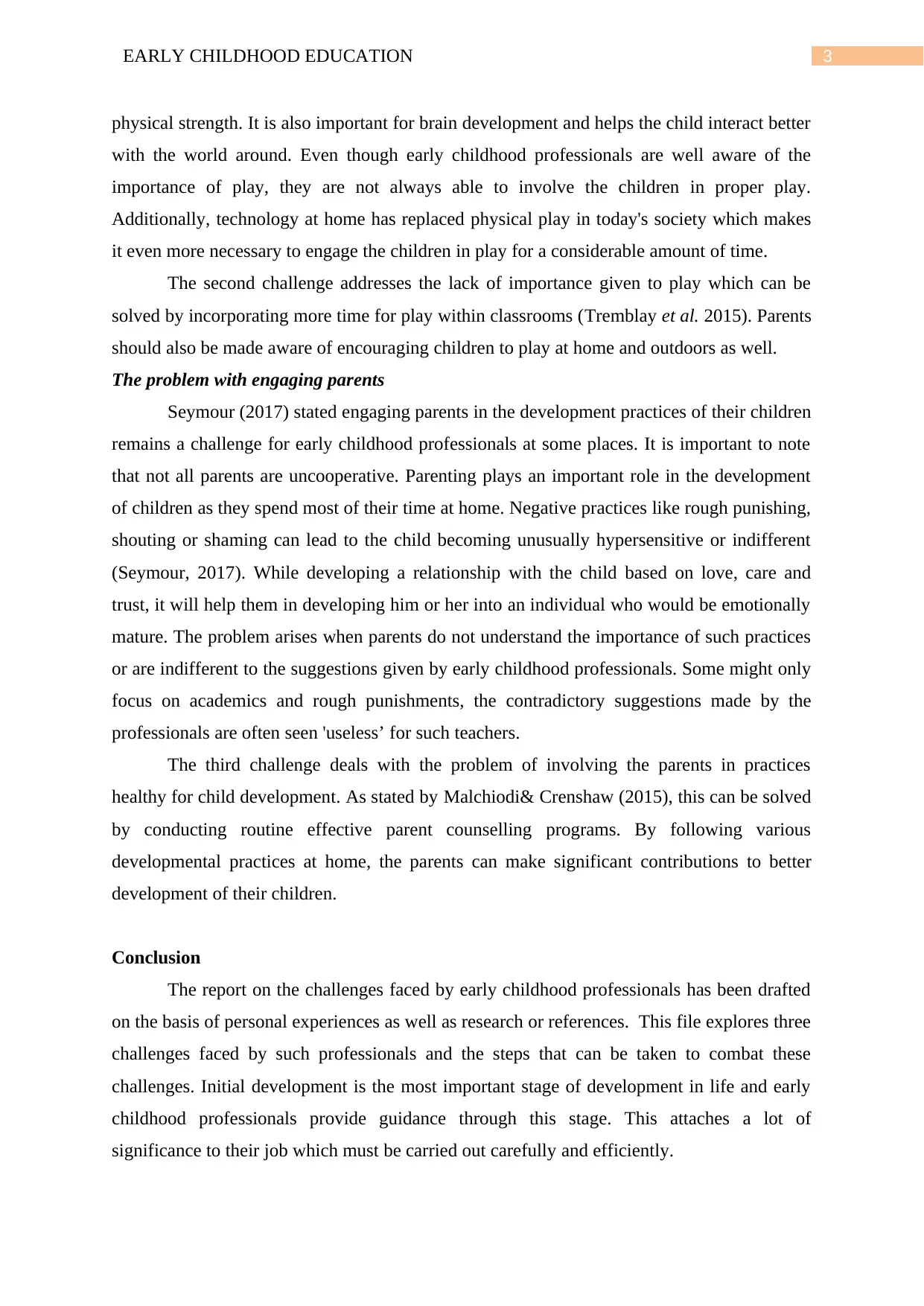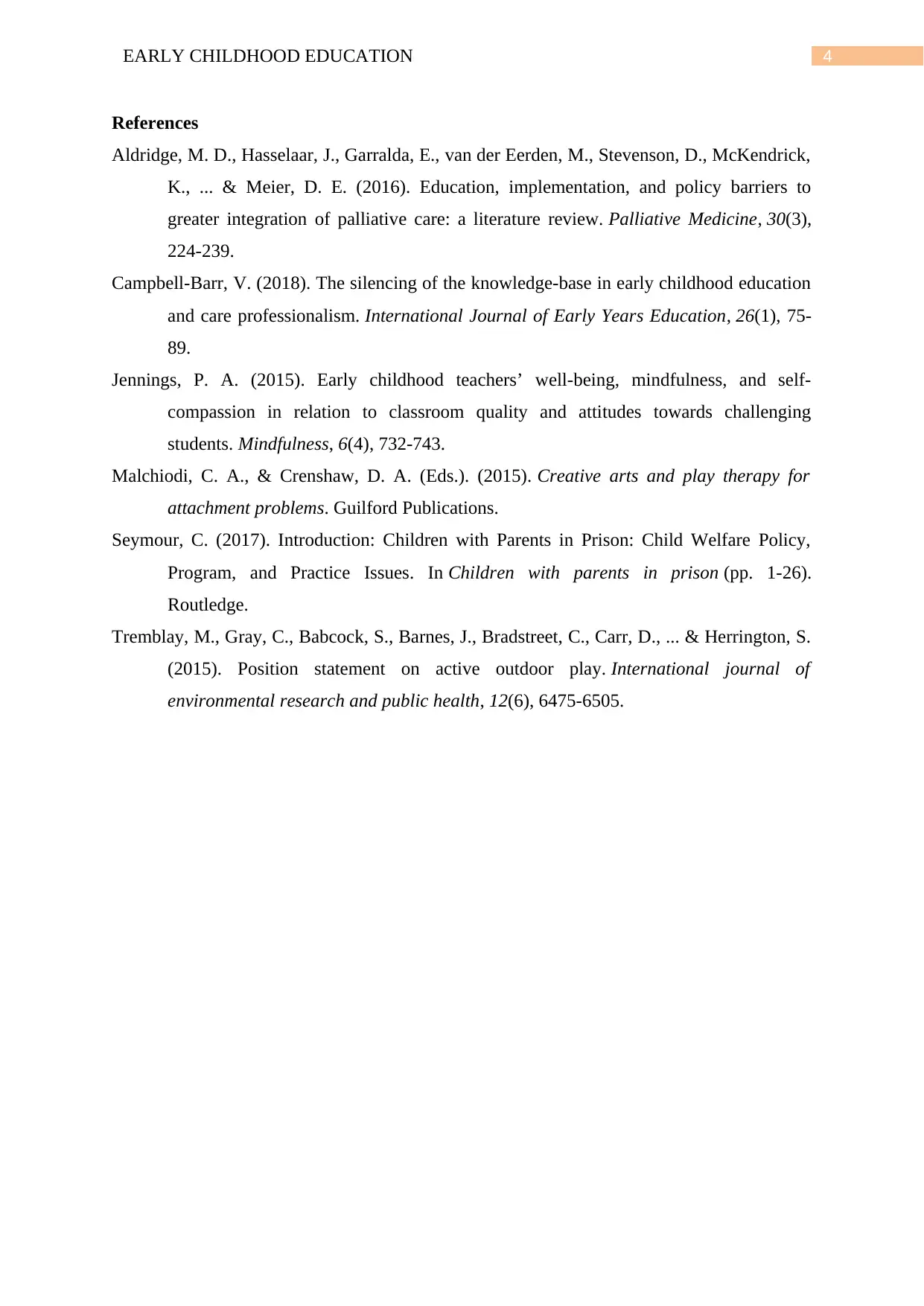Early Childhood Education Challenges: Policy, Play, & Engagement
VerifiedAdded on 2023/03/30
|4
|983
|157
Report
AI Summary
This report identifies and discusses three significant challenges faced by early childhood professionals: the gap between policy and implementation, the decreased emphasis on the importance of play, and the difficulty in engaging parents in healthy child development practices. The report highlights that policies often appear promising on paper but lack practicality, hindering their effective implementation. It emphasizes the critical role of play in fostering creativity, cognitive development, and social skills, advocating for increased playtime in classrooms and at home. Furthermore, the report addresses the challenge of involving parents in developmental practices, suggesting routine counseling programs to educate and encourage parents to actively contribute to their children's development. The conclusion underscores the importance of early childhood education and the need for professionals to address these challenges effectively to guide children through this crucial stage.

Running Head: EARLY CHILDHOOD EDUCATION
EARLY CHILDHOOD EDUCATION
EARLY CHILDHOOD EDUCATION
Paraphrase This Document
Need a fresh take? Get an instant paraphrase of this document with our AI Paraphraser

2EARLY CHILDHOOD EDUCATION
Introduction
Early childhood profession involves individuals working directly with children up to
the age of 8-year-olds. The most basic profession for an individual with an early childhood
profession degree is that of a preschool teacher monitoring the early development of children
(Jennings, 2015). A profession with such importance must be carried out carefully however,
certain challenges are faced by early childhood professionals during their work. The present
report will discuss three such challenges and provide recommendations.
Discussion of challenges and its recommendations
The challenges that are going to be addressed in the report have come across while
gaining personal experiences and doing thorough research. These challenges include the
problem of implementing the plans made for the child development; the inability to include
enough play sessions while monitoring their education along with; the problem with
interacting with the parents and guiding them through the process of proper development
practices for their children.
Gap between policy and implementation
The most significant challenge in early childhood professions is the inevitable
discrepancy between policy-making and implementation of those policies (Campbell-Barr,
2018). The methods in elementary and primary schools need to be practical to be properly
implemented. Even though the policies seem beautiful on paper, implementing them becomes
a problem. This problem has been addressed in many kinds of research and has also been
monitored during personal training. Aldridge et al. (2016) stated that problematic or
incomplete implementation of policies can negatively affect the development of the children
under such implementations or at the very least be useless for their development.
The first challenge deals with the failure of the implementation of the policies that
appear to be attractive. The problem lies with the lack of practicality of these policies. To
solve this problem, early childhood professionals should focus more on drafting policies that
are more realistic that is, they can be implemented easily within less time span.
Decreased emphasis on the importance of play
The emphasis on the play is decreasing day by day, not only in the world but also in
early childhood classrooms. In order to complete the educational curriculum, early childhood
classes have been more focused on academics which pushes aside the time for play allowing
a very limited time for play within classrooms (Tremblay et al. 2015). Through play, children
are able to increase creativity and develop imagination, dexterity, cognitive, emotional and
Introduction
Early childhood profession involves individuals working directly with children up to
the age of 8-year-olds. The most basic profession for an individual with an early childhood
profession degree is that of a preschool teacher monitoring the early development of children
(Jennings, 2015). A profession with such importance must be carried out carefully however,
certain challenges are faced by early childhood professionals during their work. The present
report will discuss three such challenges and provide recommendations.
Discussion of challenges and its recommendations
The challenges that are going to be addressed in the report have come across while
gaining personal experiences and doing thorough research. These challenges include the
problem of implementing the plans made for the child development; the inability to include
enough play sessions while monitoring their education along with; the problem with
interacting with the parents and guiding them through the process of proper development
practices for their children.
Gap between policy and implementation
The most significant challenge in early childhood professions is the inevitable
discrepancy between policy-making and implementation of those policies (Campbell-Barr,
2018). The methods in elementary and primary schools need to be practical to be properly
implemented. Even though the policies seem beautiful on paper, implementing them becomes
a problem. This problem has been addressed in many kinds of research and has also been
monitored during personal training. Aldridge et al. (2016) stated that problematic or
incomplete implementation of policies can negatively affect the development of the children
under such implementations or at the very least be useless for their development.
The first challenge deals with the failure of the implementation of the policies that
appear to be attractive. The problem lies with the lack of practicality of these policies. To
solve this problem, early childhood professionals should focus more on drafting policies that
are more realistic that is, they can be implemented easily within less time span.
Decreased emphasis on the importance of play
The emphasis on the play is decreasing day by day, not only in the world but also in
early childhood classrooms. In order to complete the educational curriculum, early childhood
classes have been more focused on academics which pushes aside the time for play allowing
a very limited time for play within classrooms (Tremblay et al. 2015). Through play, children
are able to increase creativity and develop imagination, dexterity, cognitive, emotional and

3EARLY CHILDHOOD EDUCATION
physical strength. It is also important for brain development and helps the child interact better
with the world around. Even though early childhood professionals are well aware of the
importance of play, they are not always able to involve the children in proper play.
Additionally, technology at home has replaced physical play in today's society which makes
it even more necessary to engage the children in play for a considerable amount of time.
The second challenge addresses the lack of importance given to play which can be
solved by incorporating more time for play within classrooms (Tremblay et al. 2015). Parents
should also be made aware of encouraging children to play at home and outdoors as well.
The problem with engaging parents
Seymour (2017) stated engaging parents in the development practices of their children
remains a challenge for early childhood professionals at some places. It is important to note
that not all parents are uncooperative. Parenting plays an important role in the development
of children as they spend most of their time at home. Negative practices like rough punishing,
shouting or shaming can lead to the child becoming unusually hypersensitive or indifferent
(Seymour, 2017). While developing a relationship with the child based on love, care and
trust, it will help them in developing him or her into an individual who would be emotionally
mature. The problem arises when parents do not understand the importance of such practices
or are indifferent to the suggestions given by early childhood professionals. Some might only
focus on academics and rough punishments, the contradictory suggestions made by the
professionals are often seen 'useless’ for such teachers.
The third challenge deals with the problem of involving the parents in practices
healthy for child development. As stated by Malchiodi& Crenshaw (2015), this can be solved
by conducting routine effective parent counselling programs. By following various
developmental practices at home, the parents can make significant contributions to better
development of their children.
Conclusion
The report on the challenges faced by early childhood professionals has been drafted
on the basis of personal experiences as well as research or references. This file explores three
challenges faced by such professionals and the steps that can be taken to combat these
challenges. Initial development is the most important stage of development in life and early
childhood professionals provide guidance through this stage. This attaches a lot of
significance to their job which must be carried out carefully and efficiently.
physical strength. It is also important for brain development and helps the child interact better
with the world around. Even though early childhood professionals are well aware of the
importance of play, they are not always able to involve the children in proper play.
Additionally, technology at home has replaced physical play in today's society which makes
it even more necessary to engage the children in play for a considerable amount of time.
The second challenge addresses the lack of importance given to play which can be
solved by incorporating more time for play within classrooms (Tremblay et al. 2015). Parents
should also be made aware of encouraging children to play at home and outdoors as well.
The problem with engaging parents
Seymour (2017) stated engaging parents in the development practices of their children
remains a challenge for early childhood professionals at some places. It is important to note
that not all parents are uncooperative. Parenting plays an important role in the development
of children as they spend most of their time at home. Negative practices like rough punishing,
shouting or shaming can lead to the child becoming unusually hypersensitive or indifferent
(Seymour, 2017). While developing a relationship with the child based on love, care and
trust, it will help them in developing him or her into an individual who would be emotionally
mature. The problem arises when parents do not understand the importance of such practices
or are indifferent to the suggestions given by early childhood professionals. Some might only
focus on academics and rough punishments, the contradictory suggestions made by the
professionals are often seen 'useless’ for such teachers.
The third challenge deals with the problem of involving the parents in practices
healthy for child development. As stated by Malchiodi& Crenshaw (2015), this can be solved
by conducting routine effective parent counselling programs. By following various
developmental practices at home, the parents can make significant contributions to better
development of their children.
Conclusion
The report on the challenges faced by early childhood professionals has been drafted
on the basis of personal experiences as well as research or references. This file explores three
challenges faced by such professionals and the steps that can be taken to combat these
challenges. Initial development is the most important stage of development in life and early
childhood professionals provide guidance through this stage. This attaches a lot of
significance to their job which must be carried out carefully and efficiently.
⊘ This is a preview!⊘
Do you want full access?
Subscribe today to unlock all pages.

Trusted by 1+ million students worldwide

4EARLY CHILDHOOD EDUCATION
References
Aldridge, M. D., Hasselaar, J., Garralda, E., van der Eerden, M., Stevenson, D., McKendrick,
K., ... & Meier, D. E. (2016). Education, implementation, and policy barriers to
greater integration of palliative care: a literature review. Palliative Medicine, 30(3),
224-239.
Campbell-Barr, V. (2018). The silencing of the knowledge-base in early childhood education
and care professionalism. International Journal of Early Years Education, 26(1), 75-
89.
Jennings, P. A. (2015). Early childhood teachers’ well-being, mindfulness, and self-
compassion in relation to classroom quality and attitudes towards challenging
students. Mindfulness, 6(4), 732-743.
Malchiodi, C. A., & Crenshaw, D. A. (Eds.). (2015). Creative arts and play therapy for
attachment problems. Guilford Publications.
Seymour, C. (2017). Introduction: Children with Parents in Prison: Child Welfare Policy,
Program, and Practice Issues. In Children with parents in prison (pp. 1-26).
Routledge.
Tremblay, M., Gray, C., Babcock, S., Barnes, J., Bradstreet, C., Carr, D., ... & Herrington, S.
(2015). Position statement on active outdoor play. International journal of
environmental research and public health, 12(6), 6475-6505.
References
Aldridge, M. D., Hasselaar, J., Garralda, E., van der Eerden, M., Stevenson, D., McKendrick,
K., ... & Meier, D. E. (2016). Education, implementation, and policy barriers to
greater integration of palliative care: a literature review. Palliative Medicine, 30(3),
224-239.
Campbell-Barr, V. (2018). The silencing of the knowledge-base in early childhood education
and care professionalism. International Journal of Early Years Education, 26(1), 75-
89.
Jennings, P. A. (2015). Early childhood teachers’ well-being, mindfulness, and self-
compassion in relation to classroom quality and attitudes towards challenging
students. Mindfulness, 6(4), 732-743.
Malchiodi, C. A., & Crenshaw, D. A. (Eds.). (2015). Creative arts and play therapy for
attachment problems. Guilford Publications.
Seymour, C. (2017). Introduction: Children with Parents in Prison: Child Welfare Policy,
Program, and Practice Issues. In Children with parents in prison (pp. 1-26).
Routledge.
Tremblay, M., Gray, C., Babcock, S., Barnes, J., Bradstreet, C., Carr, D., ... & Herrington, S.
(2015). Position statement on active outdoor play. International journal of
environmental research and public health, 12(6), 6475-6505.
1 out of 4
Related Documents
Your All-in-One AI-Powered Toolkit for Academic Success.
+13062052269
info@desklib.com
Available 24*7 on WhatsApp / Email
![[object Object]](/_next/static/media/star-bottom.7253800d.svg)
Unlock your academic potential
Copyright © 2020–2026 A2Z Services. All Rights Reserved. Developed and managed by ZUCOL.





